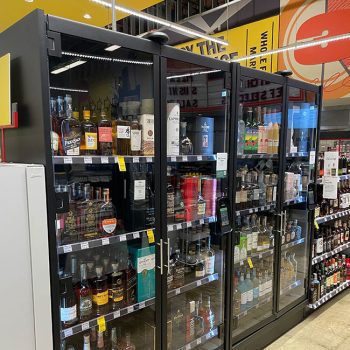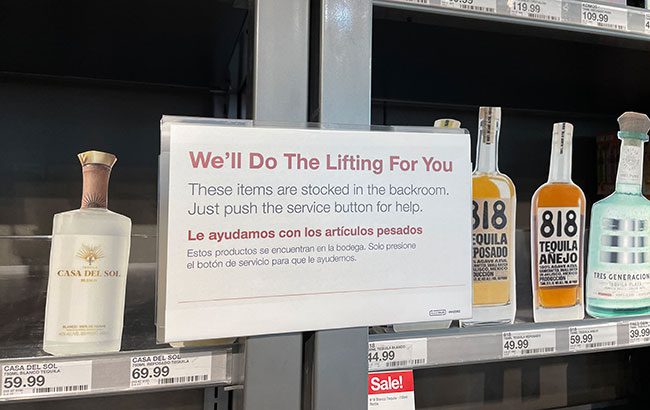How are retailers combatting spirits theft?
By Tom Bruce-GardyneCrime-hit retailers and spirits brands are taking action against theft by instigating various measures they hope will reduce the problem.

*This feature was originally published in the October 2025 issue of The Spirits Business magazine.
In the summer of 2022 Lurpak made UK headlines for possibly the first time in its history. The price of the Danish butter had hit £6 (US$8) on supermarket shelves for a 500ml tub – fitted with a security tag. The story was as much about soaring inflation as the surge in shoplifting. Suddenly, an everyday commodity needed anti-theft protection.
Butter had joined spirits, which “has always been number one in terms of theft”, says David Dalton, UK sales director at All-Tag, a US manufacturer of loss-prevention devices. It is clearly a burgeoning industry. According to the 2025 crime survey from the British Retail Consortium (BRC), retailers spent £1.8 billion (US$2.5bn) on tackling crime in 2023/24, up from £1.2bn in 2022/23.
“In 2019 retail theft amounted to £700 million. By 2024 that was £2.2bn,” says a BRC spokesman, who is clear that bottles of spirits are among the most stolen products. But he added: “The main disadvantage is they’re heavy. You can probably carry 10 £5 face creams for the same weight.”
As for paying for the £1.8bn bill that includes all the security staff and CCTV cameras, he says: “My understanding is that it’s most likely funded by the retailers themselves, but they will obviously have to raise prices or squeeze their suppliers. The money has to be made back in some way, and most of it probably ends up coming from the consumer.”
Bottle locks
For spirits, one of the first lines of defence against shoplifting is the bottle lock that has been around for about 15 years. These are fitted with an RF (radio frequency) transmitter that triggers an alarm at the exit if not removed at the till, which may be enough to deter opportunistic thieves from slipping the bottle under their coat or ‘accidentally’ forgetting to scan it. Bottle locks or tags have the advantage of being reusable, but fitting and then removing them from every bottle adds extra work for store staff.
“Because theft has got so bad, to the point where some products have been de-listed from retail, brand owners are starting to come to the table with a collaborative approach, and ask what they can do to reduce shrinkage [inventory loss],” says Dalton. “Diageo has a programme where for a promotional product displayed at the end of an aisle, they will actually apply the security device to the neck of the bottle before it goes into the supply chain. They’re collected and sent back to Diageo.”
But it is not just Diageo. “With a pallet of 100 units, we pre-tag the bottles with security tags,” says Nicola Hutchison, Whyte & Mackay’s head of off-trade for UK and Ireland. She reckons this has become common practice for suppliers, certainly in the run-up to Christmas, though throughout the year retailers “probably fit 90% of the tags”, she says.
To raise the deterrent from a simple bottle lock, All-Tag has a ‘spider wrap’ product, where the bottle is encased in a stainless-steel wire mesh. The alarm goes off if you cut the wire or run out of the shop, and keeps bleeping as you head down the street or zoom off in your getaway car. “We’ve put, maybe three million of them into the UK high street over the past few years,” says Dalton. “It has been phenomenally successful in terms of reducing shrinkage, and it’s actually increased sales as well.”
Support retailers

On that last point, Neil Boyd, commercial projects director at Ian Macleod Distillers, is sceptical, and he is certainly no fan. “They’re horrible, and they really don’t do much for the brand,” he says. “All that money you spend designing the bottle and making the label stand out on shelf is completely obliterated.” Hutchison is more accommodating. “I do think as an industry, we have to be supportive of retailers and their shrinkage issue,” she says.
As Boyd explains: “The problem of shrinkage comes in many forms. It’s not just theft by customers, it’s theft by staff, and damaged goods, but the theft aspect is definitely getting worse. It’s not too surprising, in many respects. There’s the cost-of-living crisis. There are non-custodial sentences for people who are caught, and a lack of police to do anything about it.”
He continues: “We’re all taught the buying experience at the checkout is super important. If you have a long queue, it really annoys people, so you need to minimise the queue. Self-service is an alternative to that, but then you’ve got the opportunity for more ‘errors’, so the retailers are caught between a rock and a hard place.”
In the US, the National Retail Federation put the scale of shrinkage at US$112bn in 2023 when a survey of members reported shoplifting incidents were up by 93% on 2019. At Indyme, a San Diego-based firm specialising in anti-theft technology, Mathieu Hoffmann, product and marketing vice-president, says: “There are two main types of bad actors in the US. One is the large and constantly growing number of homeless people who are mostly stealing for their own consumption, and the other is organised retail crime.”
He feels the use of bottle locks is less prevalent in the US, partly because criminals have discovered ways to block the RF signals. “One of the big things in the US over the last couple of years are retailers installing locked cases,” he says. They obviously reduce theft, but they also tend to reduce sales as frustrated shoppers walk away.
“I think the CEO of Wallgreens, in its Q1 financial results, put the negative impact on sales as high as 20%-25%,” says Hoffmann, talking about the US pharmaceutical chain that has been a big believer in locked cabinets. UK supermarkets have also trialled them, but with mixed results. Morrisons began rolling out its ‘Buzz for Booze’ cabinets in 2023. The following March, The Daily Mail accused them of provoking ‘shopper’s fury’, and quoted retail expert Richard Hammond saying: “The idea that customers can handle things and consider them before buying is now deeply ingrained in the psyche.”
Frictionless shopping
In retail-speak, the issue is known as friction, and in an effort to promote more frictionless shopping, Indyme has developed its ‘freedom case’. Shoppers are given easy access to bottles behind glass in return for sharing some personal data, typically their phone number. Hoffmann says one low-cost US retailer is thinking they may help it offer more expensive products that it wouldn’t have dared to in the past. Indyme is also trialling the idea in UK supermarket Sainsbury’s, as well as Morrisons.
“In the past couple of years, we have seen shrink levels accelerate quite alarmingly,” says James Halliday, senior commercial director, Diageo GB. “The holy grail is how do you showcase the brands, grow the category, but stop the shrink?” Asked about locked cabinets, he says: “We are not advocates of them for the whole spirits category.” But, after a recent trip to the US, he does feel they could be a solution in certain cases.
“When it comes to super-premium spirits, if you can put them in a very premium-looking display that has got the right lighting, and really shows off the special nature of the brands, it can be a way to prevent shrink and also increase sales,” he says. “I also know that some retailers who want to ensure the shopping experience is as frictionless as possible are moving their beers, wines and spirits to the front of the store. Being opposite the checkout they’ve actually seen sales increase and a significant reduction in shrink.”

For convenience stores, he says: “There’s been the introduction of digital screens where you can browse the category and get lots of advice and information. It prints off a digital ticket, which is scanned at the till and they retrieve the bottle.”
Meanwhile, RF technology has evolved into RF-ID, which “can be embedded into each label to make every bottle uniquely identifiable”, says Declan Begley, business development director at the UK’s Checkpoint, one of the largest manufacturers of these tags. They do not prevent shoplifting, but they do allow goods to be tracked right through the supply chain, where theft can occur at any point on the journey from the bottling line to the store.
There have been growing instances of criminal gangs sweeping bottles off the shelf, which can be sold on to less scrupulous retailers. Those fitted with RF-ID tags, which cost less than 10p a label, according to Begley, can be scanned to reveal where they came from. In foreign markets, it allows brand owners to track instances of parallel trading – a perennial issue for brand owners.
There may be some evidence that organised crime is moving on from spirits to other high-value items. There has been a big increase in the theft of meat in supermarkets, according to Halliday who says: “You’re even getting criminal gangs going to the meat counter to scrape all the fresh meat into a trolley.” Overall, he talks of “a genuine partnership with retailers. I am sure there’s more we can do, and definitely more collaboration is needed across the industry with all the supermarkets and local authorities.”
Related news
Retailers with strong low/no options 'will win' at Christmas
